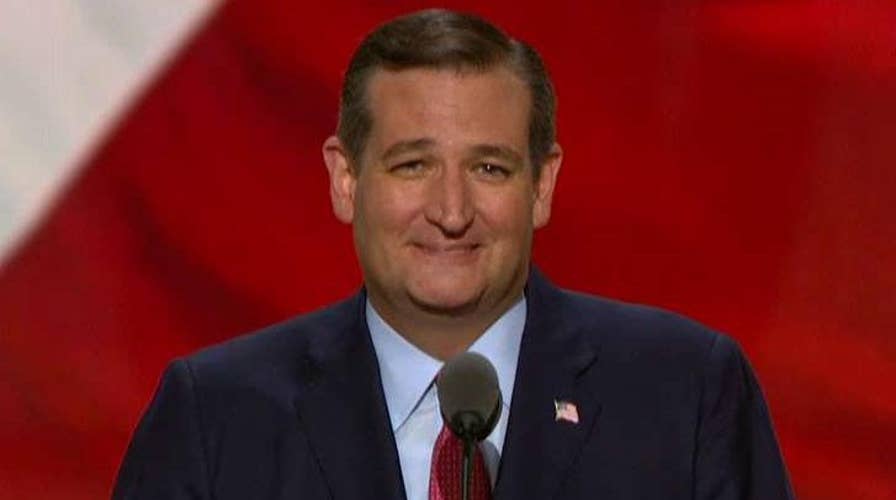Full speech: Ted Cruz at the Republican National Convention
Texas senator and former Republican presidential candidate touts party principles and freedom in Cleveland
Cleveland – About the only thing that most everyone agrees on about Sen. Ted Cruz’s speech at the Republican National Convention, it is that it was a dramatic break from politics as usual.
But views differ widely on whether Cruz’s Wednesday night speech, which barely – and apparently reluctantly – mentioned the star of the four-day event, GOP presidential nominee Donald Trump, ultimately will hurt the Texas lawmaker or raise his stock.
Many conservatives praised Cruz, seeing the firebrand senator as an unwavering warrior for individual freedom, a free market society and fighting the centralization of power in Washington, D.C.
“I thought it was an audacious speech,” Daniel Garza, executive director of Libre Initiative, a conservative group that is partly funded by the billionaire Koch brothers, told Fox News Latino. “It was audacious for what his speech did not do.”
“I salute Ted Cruz for making it about principles” over politics, Garza said. “Ted Cruz is not kowtowing, not doing what is politically expedient.”
And that, Garza noted, “rattled the Republicans in the [hall], because they wanted a full endorsement, a united front. But a lot of us conservatives are worried that Donald Trump has not been detailed about a freedom, free-market oriented agenda.”
Other Latino GOP leaders fear Cruz may have done more harm than good, both to himself and to the Republican Party.
Alfonso Aguilar, a former George W. Bush administration official who after some initial reluctance endorsed Trump, said the mogul’s invitation to Cruz to address the convention and the Tea Party darling’s decision to do so on his own terms, “was, for both, a risky strategy.”
“For Trump, it was a risk,” said Aguilar, now the head of the Latino Partnership for Conservative Principles. “The purpose of national presidential conventions is not only for party members to rally but to unify the party.”
Clearly, Cruz’s speech did just the opposite.
“His speech came across as nasty, and I think people thought, ‘What a traitor, how selfish of him,’” Aguilar said of Cruz. “He teased the audience. He came to the convention, [and] people thought he was going to endorse Trump. If you’re not going to do that, stay home.”
It wasn’t the first image of disunity projected from the floor of the RNC. That happened earlier in the week when delegations from several states made a ruckus, shouting for a roll call over convention rules. Many included supporters of Cruz who had hoped to give him one last shot at the nomination, even if only symbolically.
But that ended with the quick, official nomination of Donald Trump. The headlines moved on to other convention matters.
Looming all week was Cruz's highly anticipated speech in a prime time slot that had been negotiated between the two camps for weeks and seemed to hinge on whether or not Cruz would endorse Trump at last.
As the hour of Cruz’s speech approach, curiosity mounted – would he make the speech more about his views of where the country, and the party, should head, and re-establish himself as the standard bearer of the conservative wing? Or would he do some of that but, in the end, play to crowd (arguably not what Cruz is known for) and, if not outright endorse Trump, at least end his speech with a rallying cry for Americans to vote for Trump in November?
Instead he did neither, and GOP leaders and strategists say that the consequences for Cruz of his rogue moment will likely not be known for some time – at the very least not until the November election.
In an immediate sense, if he was hoping to accomplish what Ronald Reagan did in 1976, when he came onstage and urged support for his formal rival Gerald Ford and paved the way for his own coronation four years later, Cruz failed.
In that pivotal political moment, Reagan delivered a powerful speech and endorsed Ford.
“People saw the speech and felt they had picked the wrong person” for the GOP nomination, Aguilar said.
If Trump loses general election, Cruz’s speech may not prove a career-killer, and his chances in a White House run in a future election may even gain momentum.
But if Trump wins, many feel that Cruz will lose clout and prestige.
Tellingly, one of the most influential members of Cruz’s campaign, Rep. Steve King of Nebraska, says Cruz’s speech was not the snub to Trump many have described it as being.
“Ted opened it up right when he said congratulations to Donald Trump,” said King, who offered Cruz advice on his speech and on how to handle an endorsement – or lack thereof. “He said he was in favor of building the wall,” a nod to one of Trump’s signature campaign promises, he pointed out to FNL.
But King frowned at the hostile reaction that many delegates gave Cruz, and thought that Trump’s appearance in the audience at the end of the speech was meant to detract attention from the senator.
“The crowd was unruly,” King said. “When Trump came in, that disrupted it. Nobody came out of it with a good situation.”
In retrospect, King told FNL, Cruz should have done at least one thing differently. “I would have liked it if Ted had said that ... he will vote from Trump.”













































